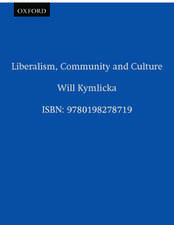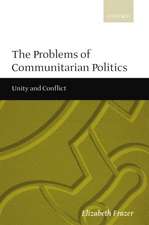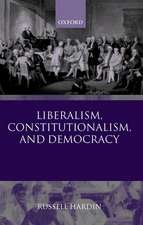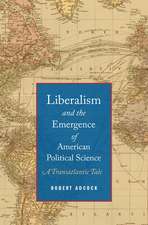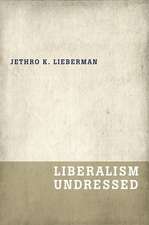Respecting Toleration: Traditional Liberalism and Contemporary Diversity
Autor Peter Balinten Limba Engleză Hardback – 12 ian 2017
Preț: 491.02 lei
Preț vechi: 704.68 lei
-30% Nou
Puncte Express: 737
Preț estimativ în valută:
93.97€ • 97.55$ • 78.35£
93.97€ • 97.55$ • 78.35£
Carte tipărită la comandă
Livrare economică 11-17 martie
Preluare comenzi: 021 569.72.76
Specificații
ISBN-13: 9780198758594
ISBN-10: 0198758596
Pagini: 176
Dimensiuni: 162 x 240 x 18 mm
Greutate: 0.4 kg
Editura: OUP OXFORD
Colecția OUP Oxford
Locul publicării:Oxford, United Kingdom
ISBN-10: 0198758596
Pagini: 176
Dimensiuni: 162 x 240 x 18 mm
Greutate: 0.4 kg
Editura: OUP OXFORD
Colecția OUP Oxford
Locul publicării:Oxford, United Kingdom
Recenzii
This short book makes many important points lucidly and concisely. Without going into the intricate details of theory, it is theoretically well-informed, and discusses many real-life examples instructively. It does not require forbearance-tolerance, but deserves great respect, even if this involves accommodating differences.
The very idea of toleration is now under attack from some who applaud cultural diversity as well as those who seek to erase it. In this timely and compelling treatment, Peter Balint explains exactly why we need toleration more than ever. Respecting Toleration is essential reading for those who care about how to navigate troubled times while remaining true to basic liberal principles.
Respecting Toleration is both thoughtful and provocative. It claims that liberal toleration well understood is capacious enough to accommodate a wide range of value- and identity-based differences. It invites scholars like myself to restrain from conferring too much normative weight to culture and conscience but calls in the same breath for more tolerant public norms and institutions. Those who disagree with Balint's claims but who understand the importance of engaging with the best counterarguments will definitely want to read his book.
Peter Balint's new book is admirably clear-sighted about the political valency of toleration, as well as about the distinct agency of citizens and the state in relation to it. Balint successfully avoids the rival lures of Machtpolitik and moralism as approaches to toleration. Aspects of the book will excite controversy, particularly regarding his view that toleration can encompass indifference. At the same time, Balint recognises that in practice indifference may often be the best we can realistically hope for, and be markedly less bad than any alternative.'
The very idea of toleration is now under attack from some who applaud cultural diversity as well as those who seek to erase it. In this timely and compelling treatment, Peter Balint explains exactly why we need toleration more than ever. Respecting Toleration is essential reading for those who care about how to navigate troubled times while remaining true to basic liberal principles.
Respecting Toleration is both thoughtful and provocative. It claims that liberal toleration well understood is capacious enough to accommodate a wide range of value- and identity-based differences. It invites scholars like myself to restrain from conferring too much normative weight to culture and conscience but calls in the same breath for more tolerant public norms and institutions. Those who disagree with Balint's claims but who understand the importance of engaging with the best counterarguments will definitely want to read his book.
Peter Balint's new book is admirably clear-sighted about the political valency of toleration, as well as about the distinct agency of citizens and the state in relation to it. Balint successfully avoids the rival lures of Machtpolitik and moralism as approaches to toleration. Aspects of the book will excite controversy, particularly regarding his view that toleration can encompass indifference. At the same time, Balint recognises that in practice indifference may often be the best we can realistically hope for, and be markedly less bad than any alternative.'
Notă biografică
Peter Balint is a Senior Lecturer and Head of International and Political Studies at the University of New South Wales in Canberra. He is a political theorist, and his current research focuses on the issues of diversity, inclusing toleration, respect, neutrality, and national identity. His previous works include Multiculturalism and the Fair Terms of Integration (co-edted with Sophie Guérard de Latour, Palgrave MacMillan, 2013).

